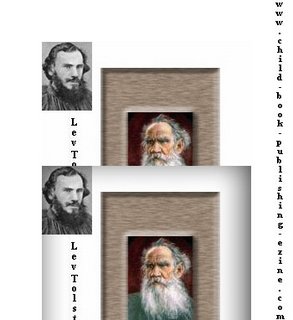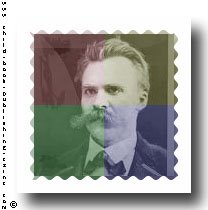 Muhammad Ali
Muhammad Ali
Search Quotes and Insights or the Entire Web
Saturday, October 28, 2006
Self-confidence!
 Muhammad Ali
Muhammad Ali
Wednesday, October 25, 2006
Patience!
 Leo Tolstoy. USSR's author. He was a Russian novelist, philosopher, anarchist, educational performer, vegetarian and pacifist. He is well known until nowadays as a greatest world writer.
Leo Tolstoy. USSR's author. He was a Russian novelist, philosopher, anarchist, educational performer, vegetarian and pacifist. He is well known until nowadays as a greatest world writer.
Lev Nikolaevich Tolstoy, as called at birth, was born on August 28, 1828 (most sources say this while other few sources say - September 9, 1828) at Yasnaya Polyana, in
His father Count Nicolas Tolstoy was from the Russian pre-Nobility. His mother, Princess Marie Volkonsky passed away two years after his birth. Lev Tolstoy's grandmothers came from the Troubetzkoy and Gorchakov princely families. Alexander Pushkin was his fourth cousin. He was the fourth of five children in his family.
His family rented a house and moved to
Leo Tolstoy began studying law and oriental languages in 1844 at
He became interested in university after that for its social aspects only. However, his social life became just as bad as his grades. He was discouraged socially and academically for some times.
Women, wine and cards were the most important interests of his class. Leo Tolstoy became sick of his empty and useless life in
Lev Nikolaevich Tolstoy completed his first story "Childhood" in 1852 and sent it to Nikolai Nekrasov to publish it in the "Sovremennik". The story succeeded and opened a great place in Russian literature for Tolstoy.
In 1854 Leo Tolstoy participated in his army fighting in Wallachia against the Turks and the defence of the Fourth Bastion and the battle of
Back from the army in 1855, Leo Tolstoy spent the following years until 1861 between
Lev Nikolaevich Tolstoy accepted the post of Justice of the Peace in 1861. His first marriage in 1856 was an unsuccessful, but his second marriage from Sofia Andreyevna Behrs in 23 September 1862 was not only successful, but it was considered the real stability life that led Leo Tolstoy to great achievement in literature. He lived with
Lev Tolstoy’s work "The Kingdom of God is Within You" which featured his ideas on non-violent resistance, influenced Martin Luther King and Mahatma Gandhi.
Collection of some other news in different languages:
Political news in Arabic at - Human Rights Arabic Translation
Political news in English at - Ghost Houses
Political and other news in Danish at - Human Rights in Danish
Wednesday, October 18, 2006
Tuesday, October 17, 2006
Resolution to Succeed!
Abraham Lincoln, 16th US president
Friday, October 13, 2006
Tuesday, October 03, 2006
Power!
 Friedrich Nietzsche was a German philosopher. He lived in the late 19th century and challenged the traditional morality and Christianity. He relied on the facts of life on our world not on that world beyond our senses. He inspired leaders in all cultural life like poets, novelists, painters, dancers, musicians, psychologists, philosophers, sociologists and social revolutionaries.
Friedrich Nietzsche was a German philosopher. He lived in the late 19th century and challenged the traditional morality and Christianity. He relied on the facts of life on our world not on that world beyond our senses. He inspired leaders in all cultural life like poets, novelists, painters, dancers, musicians, psychologists, philosophers, sociologists and social revolutionaries.Friedrich Wilhelm Nietzsche was born on October 15, 1844 in a rural farmland southwest of Leipzig in small German town called Rocken bei Lutzen (Rocken bei Lutzen). He was named after the Prussian King, Friedrich Wilhelm IV, because his birthday coincided with the 49th birthday of the king, who had been responsible to appoint Friedrich Nietzsche's father as Rochen's town minister.
Friedrich Nietzsche's grandfathers were Lutheran ministers, but his paternal grandfather, Friedrich August Ludwig Nietzsche, was distinguished as a Protestant scholar. While Friedrich Nietzsche was 4 years old, his father Karl Ludwig Nietzsche died (1813-1849) and his two years old brother, Joseph died six months after his father. The family left the town soon after that, to Naumburg a der Saale, where Friedrich Nietzsche lived for eight years with his mother, Franziska (1826-1897), his paternal grandmother, Erdmuthe, his father's two sisters, Auguste and Rosalie, and his younger sister, Therese Elisabeth Alexandra (1846-1935).
Friedrich Nietzsche attended boarding school Schulpforta near Naumburg at the age of 14 until 19 when he prepared for his university studies. Friedrich Nietzsche led during summers the Germania music and literature club and became acquainted with Richard Wagner's music. Friedrich Nietzsche met Paul Deussen during his studies and they became friends. Deussen became later an Orientalist, historian of philosophy, and the founder of the Schopenhauer Society in 1911.
While Friedrich Nietzsche was a teenager he read the German romantic writings of Friedrich Hölderlin and Jean-Paul Richter, plus David Strauss's "Life of Jesus Critically Examined 1848.
Friedrich Nietzsche graduated from Schulpforta and entered the University of Bonn in 1864 as a theology and philosophy student, but his interests drove him more towards philology.
As a philosopher and philologist Friedrich Nietzsche criticized religion, morality, contemporary culture and philosophy. His published critiques imposed fundamental questions regarding the life-affirming and life-denying qualities of different attitudes and beliefs.
Friedrich Nietzsche received recognition during the 20th century in German, French and some British intellectual institutions and regarded influential figure in modern philosophy.
Friedrich Nietzsche received an extraordinary offer to become professor of classical philology at the University of Basel before having him completed his doctorate. He published during 1873 and 1876 four long essays: David Strauss: the Confessor and the Writer, On the Use and Abuse of History for Life, Schopenhauer as Educator, and Richard Wagner in Bayreuth. Those four essays published as a collected edition later under the title of: Untimely Meditations.
Friedrich Nietzsche travelled frequently and lived until 1889 as an independent author in different cities in Europe. He lived from his pension from Basel and received aid from friends.He published "Daybreak: Reflection on Moral Prejudices" in 1881, the first part of "The Gay Science" in 1882, and "Beyond Good and Evil" in 1886.
Friedrich Nietzsche continued to have frequent attacks of illness. In 1887, Friedrich Nietzsche wrote the polemic "On Genealogy of Morals". He had mental collapse in January 3, 1889. His health deteriorated and he died in August 25, 1900.
From his works:
The Birth of Tragedy
Untimely Meditations
Human, All Too Human
Day break
The Gay Science
Thus Spoke Zarathustra
Beyond Good and Evil
On the Genealogy of Morals
The Case of Wagner
The Twilight of the Idols
The Antichrist
Ecce Homo
Nietzsche Contra Wagner



